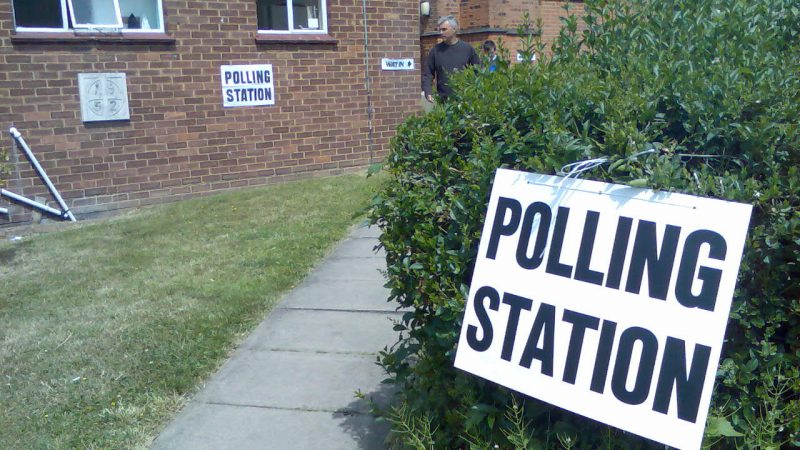‘Inflection points like these are reminders of quite how absurd our electoral system can be’

Harry Gold is media and press officer at Compass
Last Thursday, after weeks of speculation, it finally happened: Reform overtook the Tories in a poll. As a result, Nigel Farage was able to counter desperate Tory pleas that a vote for Reform was a ‘wasted vote’ by turning the argument back on them.
Whoever is right is almost beside the point. Whatever happens, we are now likely looking at a defeat of historic proportions for the Tory Party.
As many have said already, this has little to do with an unprecedented surge in enthusiasm for Labour. The same poll that put Reform ahead of the Tories put Labour on just 37% – three points below where it ended up in 2017. But under FPTP, none of this particularly matters.
Because our voting system only requires the winners to do better than their nearest opponents, parties can sail to power on a wave of indifference as long as there is enough competition on the other end of the political spectrum. It’s exactly this effect that has kept the Tories afloat for the last 14 years.
In 2019, there were 62 seats where the combined progressive vote outnumbered the Conservative vote, but the Tories won because the vote was divided between two, three or more parties. There has been a progressive majority in this country in almost every election since 1979 – but just three of these resulted in a non-Tory government because of the way in which FPTP punishes the fractured progressive vote.
Now, the shoe is on the other foot: the right-wing vote is now well and truly split between the Tories and Reform. As a result, we’re now looking at the very real possibility that Labour will win an unprecedented supermajority on little more than one third of the vote. Meanwhile, because of the sheer weirdness of our electoral system, every other party could win seemingly random numbers of seats with no apparent relation to their vote share.
Nigel Farage is now claiming to be ‘leader of the opposition’ after the poll that put his party ahead of the Tories. Ed Davey could, if he so wished, lay claim to the same title: some MRP polls pose the absurd (and, admittedly, improbable) situation in which the Lib Dems become His Majesty’s Opposition – despite currently being fourth in the polls – purely because of the effect of tactical voting and the efficiency of their vote spread.
It’s hard to look at all of this without feeling at least some level of schadenfreude – after all, the Tories have been more vociferous than any other party in their defence of FPTP. This is a system that has held them up for decades – centuries, even – but this time around could be responsible for firing them into electoral oblivion. Satisfying? Yes. But inflection points like these are reminders of quite how absurd our electoral system can be.
FPTP creates huge majorities while obscuring what’s really going on just beneath the surface. Even with the Tories at rock bottom, the combined Conservative and Reform vote share is still equal to the Labour vote share (37%). Under a proportional system, both parties combined would be on course to equal Labour’s seat tally. Under FPTP, it’s safe to say we can expect no such thing.
On the other side of an election, there will be a fight for the soul of the Tory party (yes, another one). Whoever wins this battle will face an almighty task in putting the party’s coalition back together. But, if they can pull it off, the support is out there. Any realignment of the centre right after the election that welcomes in people like Nigel Farage and has a coherent story about our country and its future could pose a very real threat to a Labour government that will immediately be thrown from crisis to crisis. Worryingly, a survey of Tory party members for Conservative Home found a majority supported a deal with Reform, and even welcoming Farage into the party.
Farage’s only goal is clearly to remould the Conservative Party in his own image – he’s made no secret of that. He’s done it before with Brexit and these polls show he could do it again after the election. Labour might win in a few weeks but it should be very wary of whatever emerges from the ashes of this Conservative defeat.
All of this should be playing on the minds of Keir Starmer and his shadow cabinet. But these fragile and dangerous dynamics will be obscured by our voting system that ultimately, if the polls are to be believed, is about to deliver Labour an absolutely stonking majority. Keir Starmer keeps saying ‘no complacency,’ but it is already beginning to set in among activists – with the polls where they are, how could it not? But while Labour might win big under this crumbling settlement, there will be no honeymoon for them to enjoy.
Things will get tough, and quickly. Keir Starmer will need to build broad and lasting alliances to make his victory not just historic, but fit for the future.
(Image credit: Flickr / Creative Commons)
To reach hundreds of thousands of new readers and to make the biggest impact we can in the next general election, we need to grow our donor base substantially.
That's why in 2024, we are seeking to generate 150 additional regular donors to support Left Foot Forward's work.
We still need another 124 people to donate to hit the target. You can help. Donate today.



